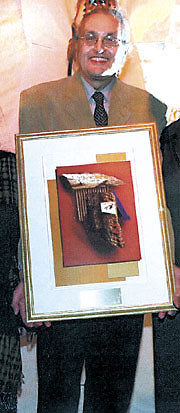
 |

|
|
 |
|
|
|||
 |
by Barbara Black André Dudemaine, who taught a course this year from an aboriginal perspective in the Mel Hoppenheim School of Cinema, received a prize recently on behalf of an organization he helped start. Terres en Vues/Land InSights was founded in 1990 by Dudemaine, Daniel Corvec and Pierre Thibeault, and is run by an 11-member board of directors who represent the Mohawk, Huron-Wendat, Abenaki, Innu and Cree nations. The prize was given to Land InSights for developing the Montreal First Peoples’ Festival, which has screened more than 600 films and videos since it started in 1991. Dudemaine said in a phone interview that he has been a cinephile almost all his life. He grew up in Abitibi, the son of an Inuit mother and a French-Canadian father. “I always belonged to the ciné club at secondary school and college,” he recalled. In the 1970s, he worked in community development, using television production as a tool to explore and celebrate native culture. He made a “small, experimental” film called Abidjévis, named for a mountain near Abitibi, and took it to the Belmont Film Festival, where it earned some notice. This has been Dudemaine’s first year teaching at Concordia, and he seems to have enjoyed the experience. His course, First Nations and Film, starts with Danse indienne, the very first film about aboriginals in Quebec, made by an associate of France’s Lumière brothers late in the 19th century, to a recent release, Smoke Signals, heralded as the first all-aboriginal movie, from production and writing to execution. Early in his career, Dudemaine worked as an assistant on a film being made by Arthur Lamothe, who is well known in Quebec for his sensitive documentaries about aboriginal people. The two men developed a friendship, and Lamothe now acts as a consultant to the film festival and other activities of Land InSight. In the First Peoples’ Film Festival, screenings are held over 10 days in June at the NFB Centre and the Cinémathèque québécoise. Priority is given to works produced by aboriginals, but non-native productions on Indian and Inuit themes are also welcome. Entries come in many languages — aboriginal, English, French and Spanish. For the past two years, due to a growth in the quantity and quality of the submissions, the festival has been competitive. Four prizes are awarded in two categories, creation and communities. The next film and video festival is scheduled for June 11- 21. Terres en Vues/Land InSights’
Web site is at http://www.native
lynx.qc.ca/. |
|